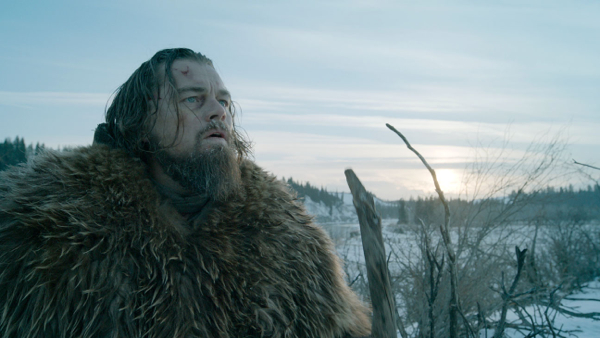Movie review by Greg Carlson
Leading all Oscar challengers with a total of twelve nominations, Alejandro Gonzalez Inarritu’s “The Revenant” has to overcome a few daunting statistics reported by prognosticator Scott Feinberg in order to win Best Picture. Feinberg notes that only one movie in the last fifty years (“Titanic,” which, coincidentally starred Leonardo DiCaprio) snagged the top prize without a screenplay nomination. Additionally, “Braveheart” was the last film to collect Best Picture sans a best ensemble SAG Award nod, and that was twenty years ago. It’s a pretty safe bet, however, that “The Revenant” won’t go home empty handed, as star DiCaprio is widely seen as the frontrunner in the Best Actor category.
Inarritu’s radical reimagining of the Hugh Glass story veers so wildly from anything like historical fidelity that the movie should have just cut the tag “Inspired by true events.” Even so, the narrative retains several key components from the adventurer’s biography – most notably the 1823 grizzly bear attack in present-day South Dakota and Glass’ remarkable odyssey of survival. Opinions on the rendering of the former run the gamut, but compared to the story’s treatment of women and Native Americans – and especially Native American women – it is clearly better to be a bear. Following the mauling, Glass is not expected to live, and two expedition members, the surly John Fitzgerald (Tom Hardy) and the young Jim Bridger (Will Poulter) are assigned to stand watch over Glass until he expires.
What follows is not exactly the roaring rampage of revenge promised in the film’s advertisements, but rather a protracted fever dream of human-versus-nature challenges. The fabrication/addition of Hawk (Forrest Goodluck), the teenage Pawnee son of Hugh Glass, registers only as a plot gambit to intensify Glass’ thirst for reprisal, but many viewers will wonder why Inarritu and co-screenwriter Mark L. Smith withhold scenes that would establish a stronger bond between parent and child.
“The Revenant” has divided cinephiles who alternately marvel at the natural light accomplishments of superhero cinematographer Emmanuel Lubezki and criticize the award season campaigning on behalf of the movie by its makers. Back in July of 2015, Kim Masters wrote a feature for “The Hollywood Reporter” chronicling the brutal physical conditions under which the movie’s principal photography took place. Masters’ piece set the stage for a making-movies-is-hard narrative that served the production until a backlash from writers like Devin Faraci started calling bullshit on the looping PR repetition of DiCaprio being cold and wet and gnawing on a real bison liver.
Inarritu haters have been taking shots at the filmmaker long before “Birdman” scored the picture, director, screenplay, and cinematography Oscars, and “The Revenant” will do nothing to quiet the din. Jaime N. Christley’s “Slant” takedown, for example, is worth reading for the volley of zingers like this one: “Inarritu doubles down on his rudimentary grasp of visual metaphors with a straight-faced update of the birthing gag from Steve Oedekerk’s ‘Ace Ventura: When Nature Calls.’” Even so, Inarritu is capable of commanding screen space with a sense of grandeur that owes much to the influence of Terrence Malick.
Christley’s snark aside, Inarritu’s biggest mistake may be failing to honor the grim resolution of Glass’ quest for satisfaction as it stands in the historical record. The climactic mortal combat confrontation between Glass and Fitzgerald – a predictable cinematic inevitability given the film’s considerable budget – is nowhere near as existentially bleak as Michael Punke’s rendition or the reality in which Glass recovers his rifle but cannot, or does not, mete out any physical retribution against his enemy.
